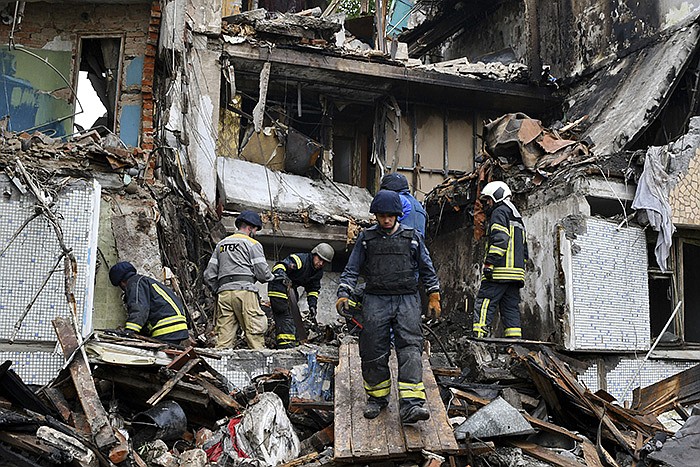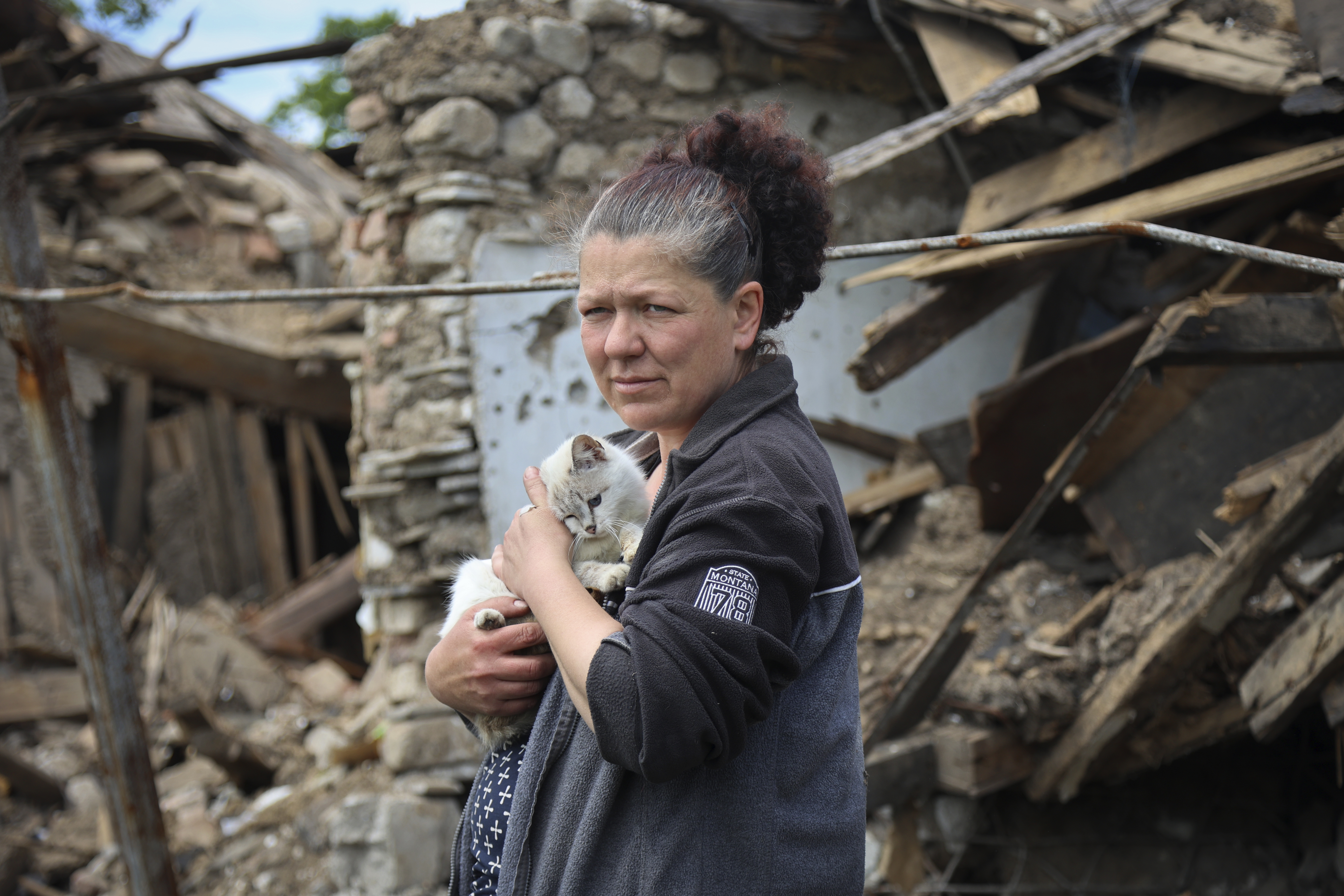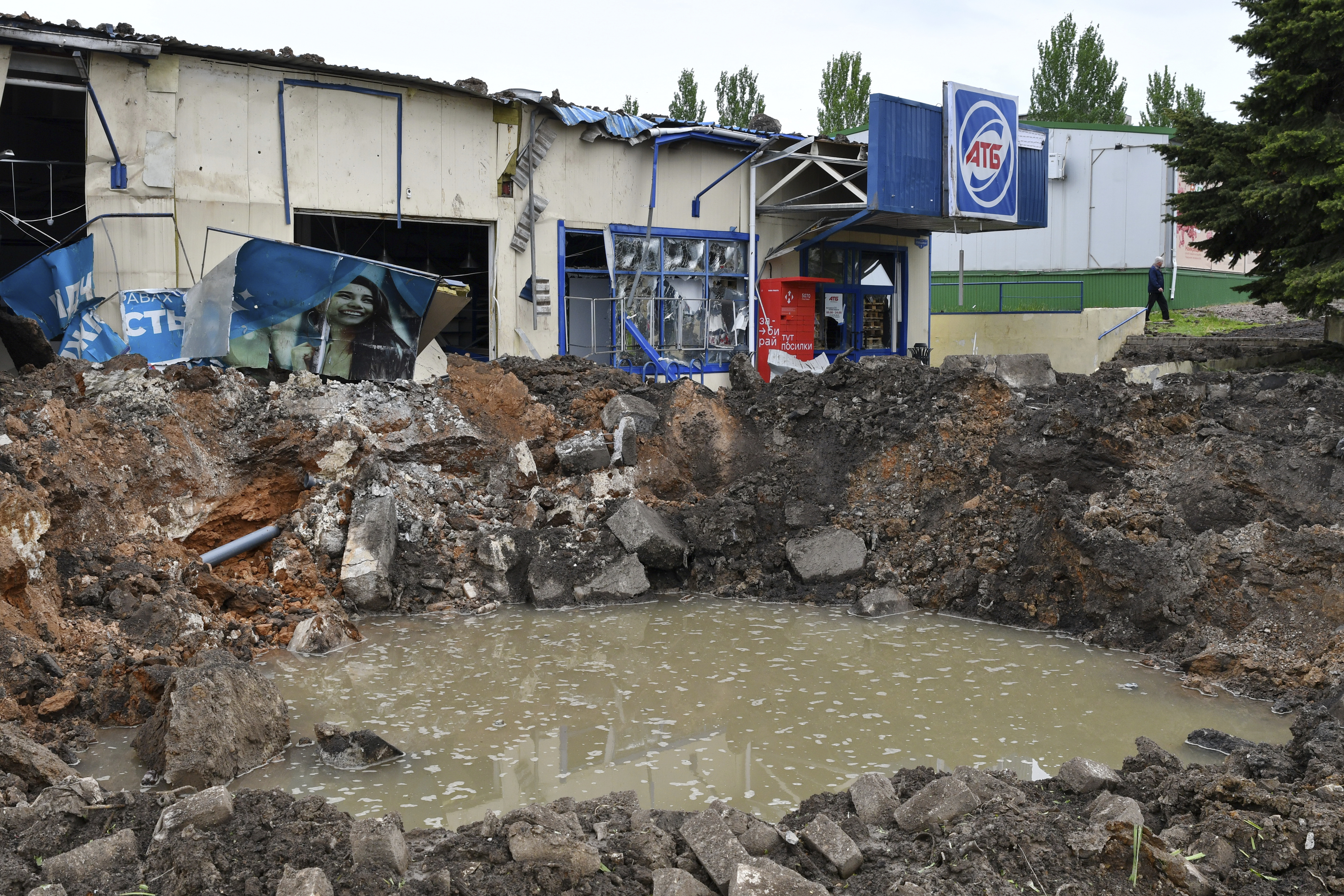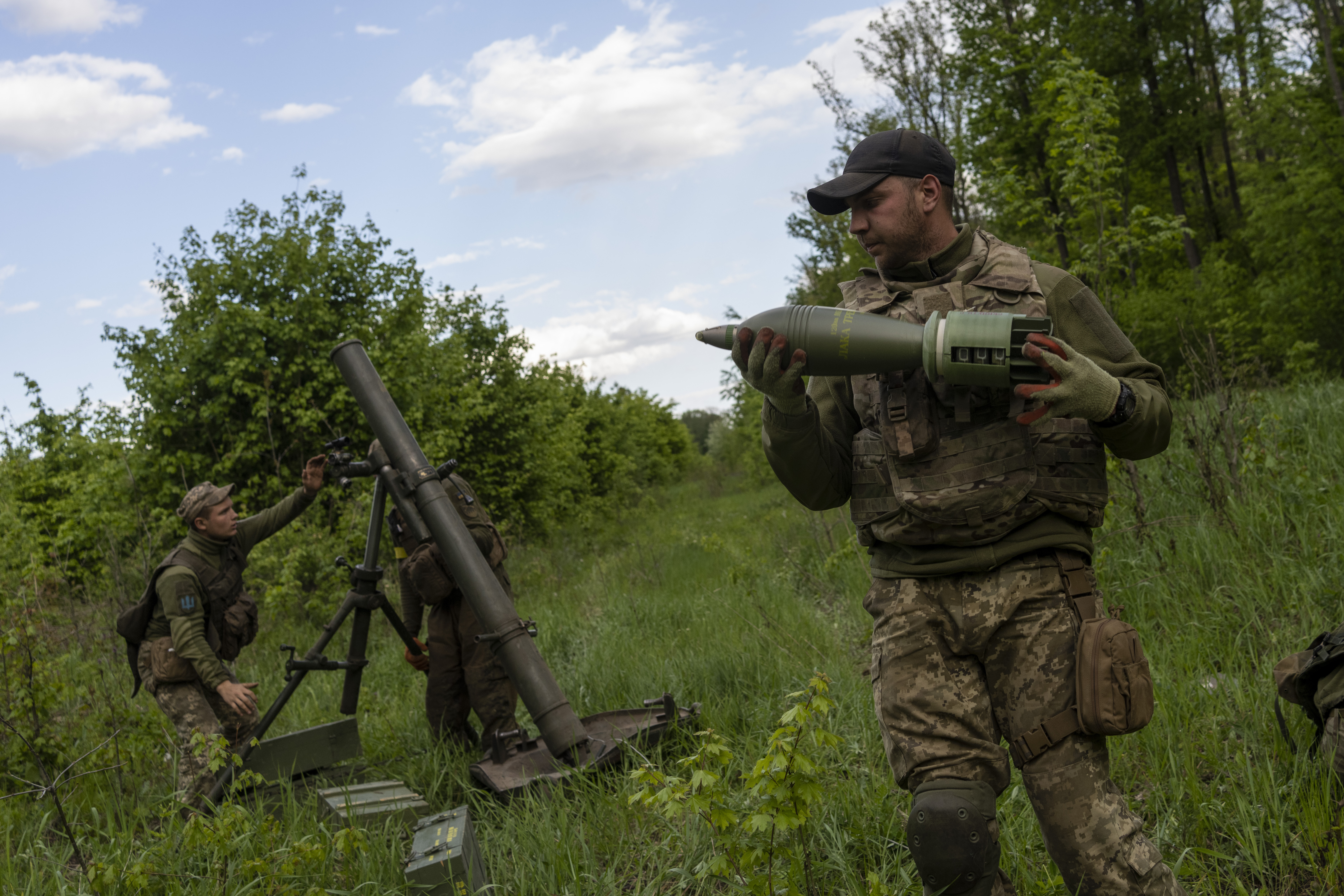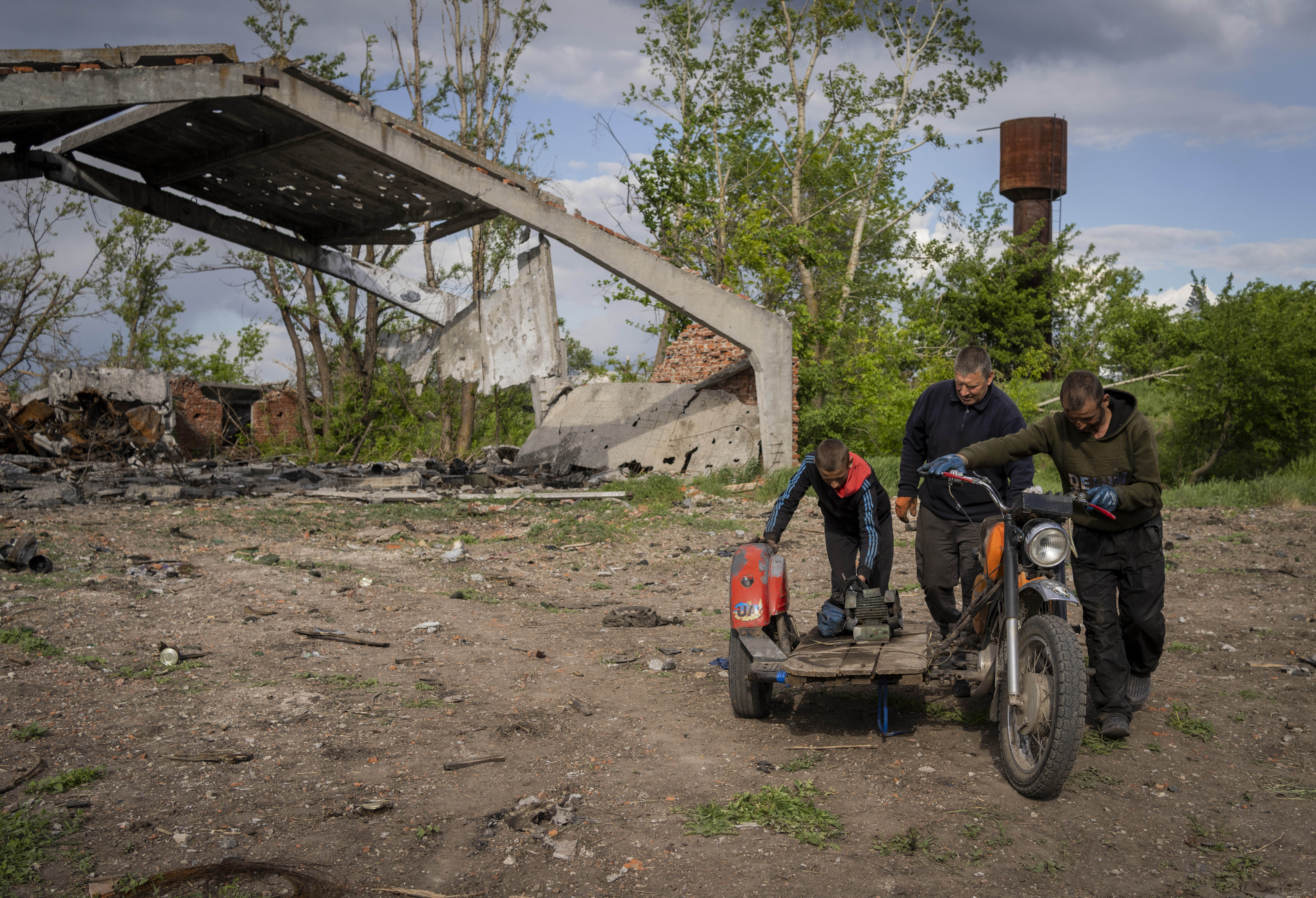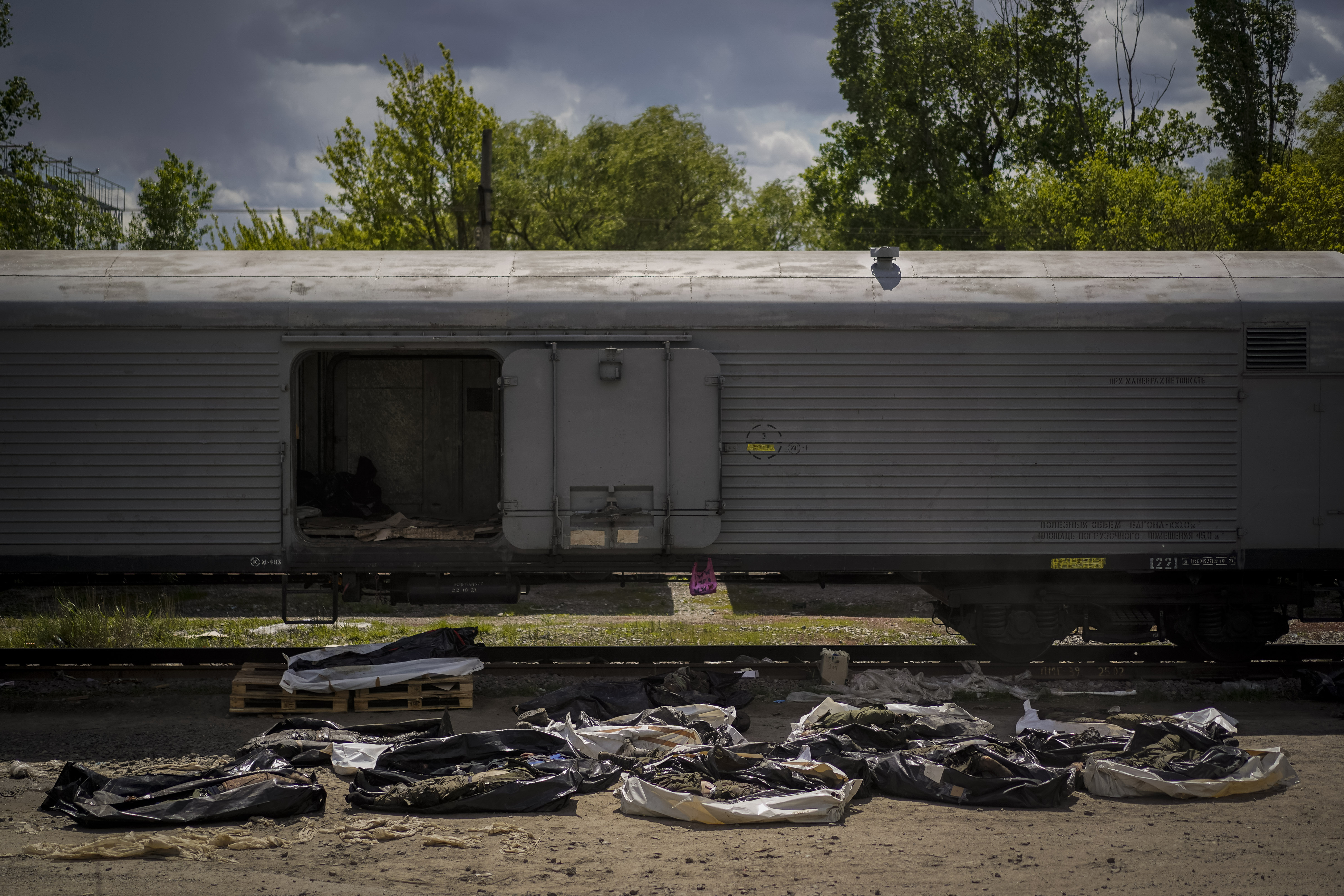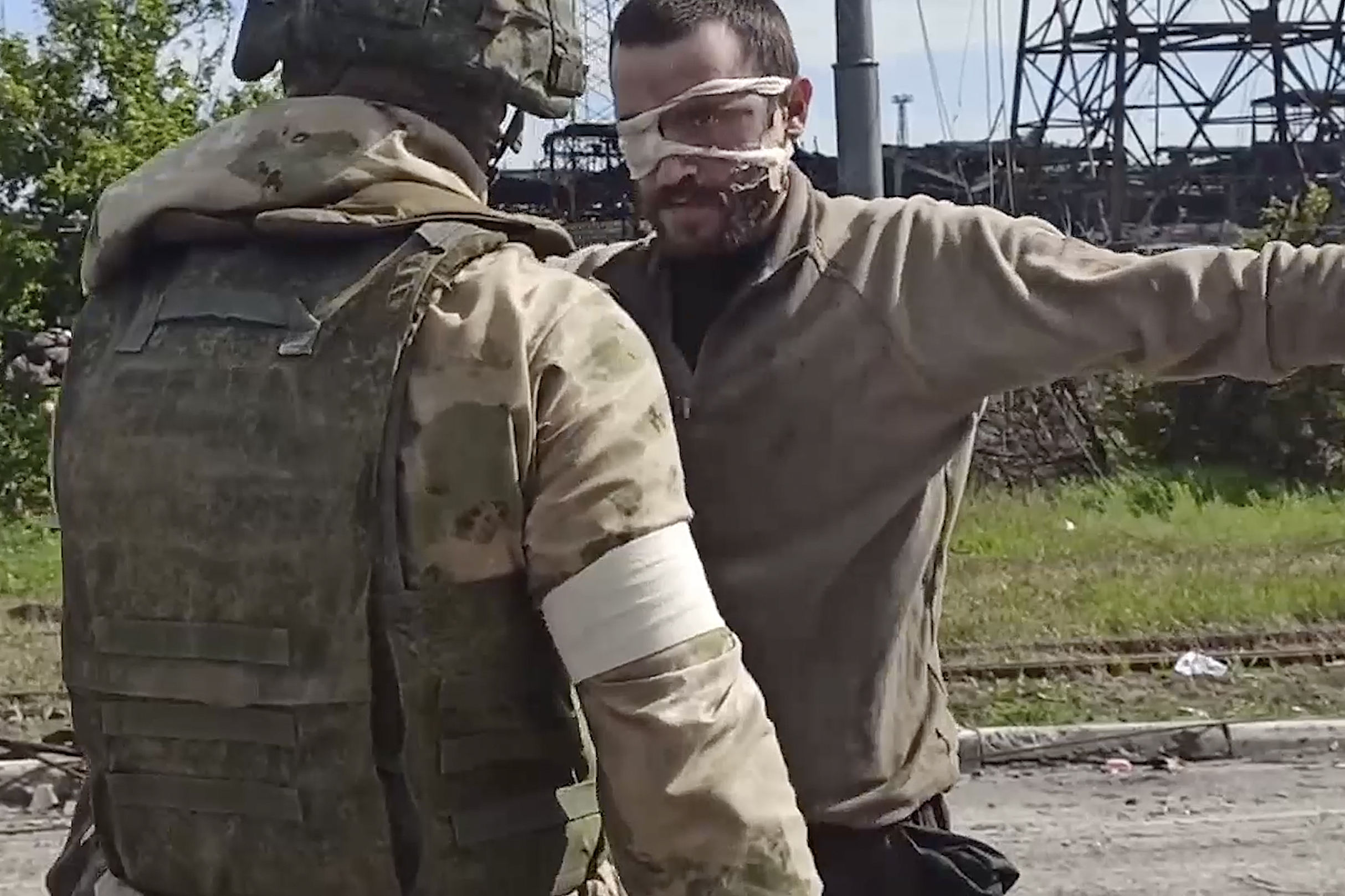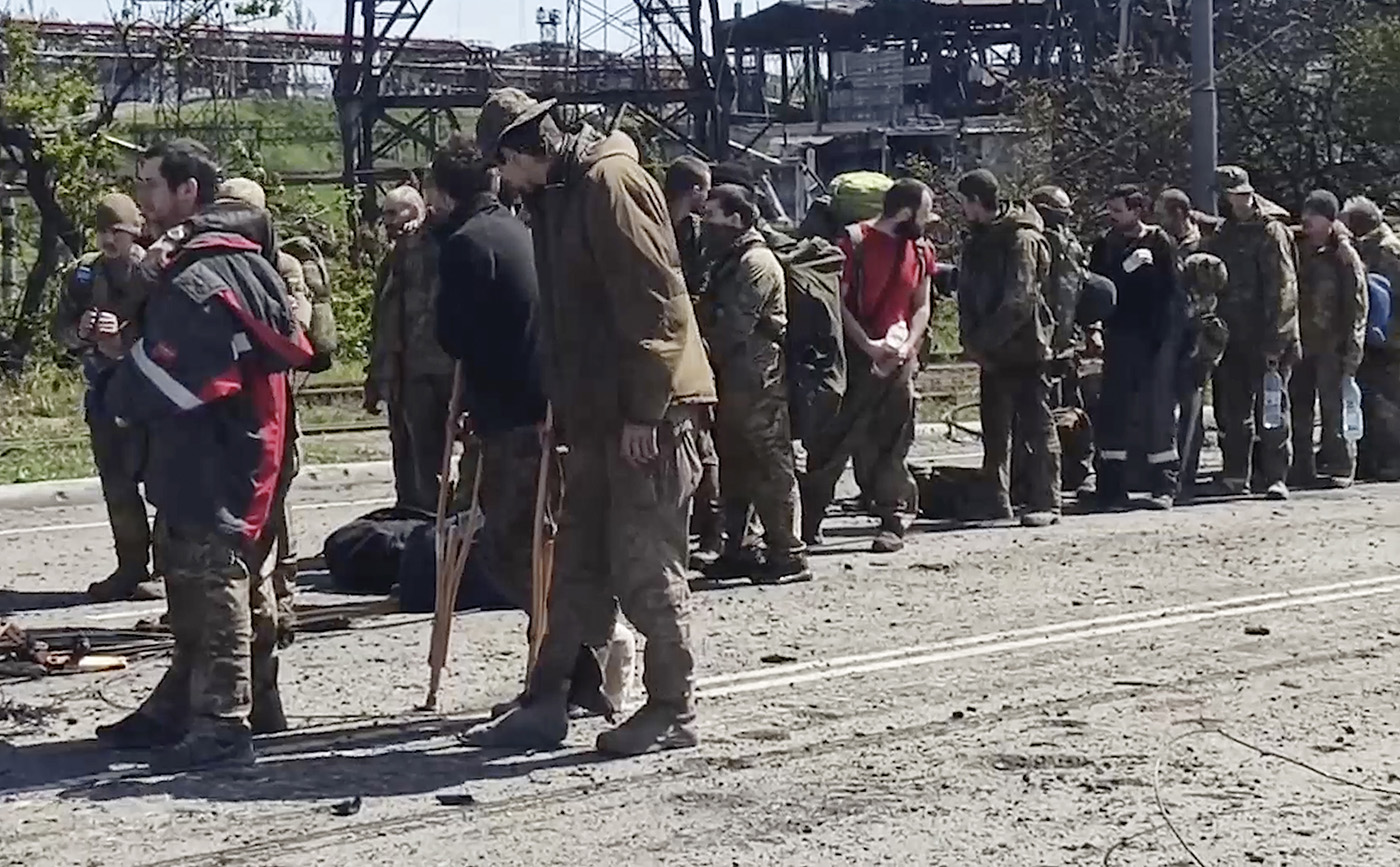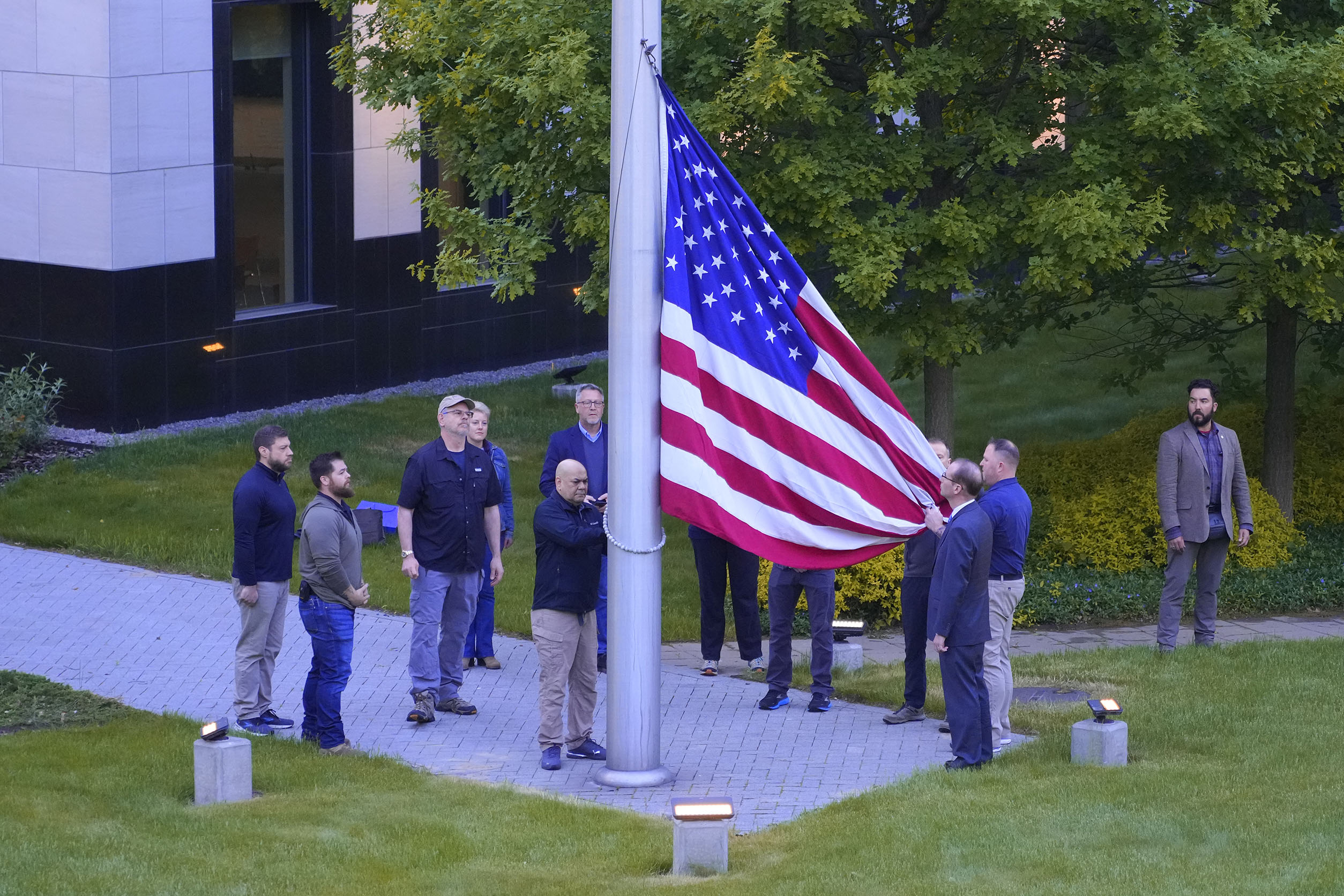KYIV, Ukraine -- Nearly 1,000 last-ditch Ukrainian fighters who had held out inside Mariupol's pulverized steel plant have surrendered, Russia said Wednesday, as the battle that turned the city into a worldwide symbol of defiance and suffering drew toward a close.
The Ukrainian fighters who emerged from the ruined Azovstal steelworks after being ordered by their military to abandon the last stronghold of resistance in the now-flattened port city face an uncertain fate. Some were taken by the Russians to a former penal colony in territory controlled by Moscow-backed separatists.
While Ukraine said it hopes to get the soldiers back in a prisoner swap, Russia threatened to put some of them on trial for war crimes.
Amnesty International said the Red Cross should be given immediate access to the fighters. Denis Krivosheev, Amnesty's deputy director for the region, cited lawless executions alleged to have been carried out by Russian forces in Ukraine and said the Azovstal defenders "must not meet the same fate."
It was unclear how many fighters remained inside the plant's labyrinth of tunnels and bunkers, where 2,000 were believed to be holed up at one point. A separatist leader in the region said no top commanders had emerged from the steelworks.
The plant was the only thing standing in the way of Russia declaring the full capture of Mariupol. Its fall would make Mariupol the biggest Ukrainian city to be taken by Moscow's forces.
Military analysts, though, said the city's capture at this point would hold more symbolic importance than anything else, since Mariupol is already effectively under Moscow's control and most of the Russian forces that were tied down by the drawn-out fighting have already left.
Russian Defense Ministry spokesman Maj. Gen. Igor Konashenkov said 959 Ukrainian troops have abandoned the stronghold since they started coming out Monday.
Video showed the fighters carrying out their wounded on stretchers and undergoing pat-down searches before being taken away on buses escorted by military vehicles bearing the pro-Kremlin "Z" sign.
Mariupol's defenders clung to the steel mill for months, preventing Russia from completing its occupation of the city and its port.
Its full capture would give Russia an unbroken land bridge to the Crimean Peninsula, which it seized from Ukraine in 2014.
For Ukraine, the order to the fighters to surrender could leave President Volodymyr Zelenskyy's government open to allegations it abandoned the troops he described as heroes.
"Zelenskyy may face unpleasant questions," said Volodymyr Fesenko, who heads the independent Penta think tank in Kyiv. "There have been voices of discontent and accusations of betraying Ukrainian soldiers."
A hoped-for prisoner swap could also fall through, he cautioned.
Russia's main federal investigative body said it intends to interrogate the surrendering troops to "identify the nationalists" and determine whether they were involved in crimes against civilians.
Also, Russia's top prosecutor asked the country's Supreme Court to designate Ukraine's Azov Regiment -- among the troops that made up the Azovstal garrison -- as a terrorist organization. The regiment has roots in the far right.
The Russian parliament was scheduled to consider a resolution to ban the exchange of any Azov Regiment fighters but didn't take up the issue Wednesday.
Mariupol was a target of the Russians from the outset. The city had a prewar population of about 430,000 now reduced by about three-quarters, and Ukraine says over 20,000 civilians have been killed there.
Britain's Defense Ministry said Ukraine's defense of Mariupol "inflicted costly personnel losses" on Russian forces.
The U.S. has gathered intelligence that shows some Russian officials have become concerned that Kremlin forces in Mariupol are carrying out abuses, including beating and electrocuting city officials and plundering homes, according to a U.S official familiar with the findings.
The Russian officials are concerned that the abuses will further inspire residents to resist the occupation and that the treatment runs counter to Russia's claims that its military has liberated Russian speakers, according to the official.
U.S. EMBASSY REOPENS
In a sign of normalcy returning to Kyiv, the U.S. Embassy reopened on Wednesday, one month after Russian forces abandoned their bid to seize the capital and three months after the outpost was closed. A dozen embassy employees watched solemnly as the American flag was raised.
"The Ukrainian people, with our security assistance, have defended their homeland in the face of Russia's unconscionable invasion, and, as a result, the Stars and Stripes are flying over the Embassy once again," Secretary of State Antony Blinken said in a statement. Other Western countries have been reopening their embassies in Kyiv as well.
The Kremlin, meanwhile, moved to expel 85 Spanish, French and Italian diplomats. Russia and a host of European countries have been throwing out each other's diplomats since the invasion.
Russian Deputy Prime Minister Yuri Borisov said Russia has begun using a prototype new laser weapon in Ukraine that is capable of hitting a target 3 miles away, state news agency Tass quoted him as saying on national television. He said it was tested Tuesday against a drone and incinerated it within five seconds.
Borisov said a new generation of laser weapons will eventually allow Russia to conserve its expensive long-range missiles.
Speaking late Wednesday in his nightly video address, Zelenskyy likened the Russian boast to Nazi Germany's claims of Wunderwaffe, or wonder weapons, as the tide began to turn against it during World War II.
A senior U.S. defense official said Wednesday that the U.S. has seen nothing to corroborate the claims.
Zelenskyy also said Ukraine is determined to retake the southern cities of Kherson, Melitopol, Berdyansk, Enerhodar and Mariupol.
"All of our cities and communities under occupation ... should know that Ukraine will return," he said.
STOCKING BACK UP
Meanwhile, the European Union on Wednesday urged member countries to quickly replenish their depleted stocks of ammunition and military equipment, and offered financial incentives to those willing to work together to replace materiel sent to Ukraine.
Many of the EU's 27 members have sent equipment to help Ukrainian troops since Russia invaded on Feb. 24. At first it was mostly ammunition, but now includes portable missiles to destroy warplanes and tanks, as well as heavier equipment.
The EU's executive branch, the European Commission, is offering a fund of $526 million over two years to countries willing to work in groups of at least three to replenish their stocks. Officials declined to say, for security reasons, exactly what kinds of shortages nations have.
The commission is also ready to provide incentives to encourage countries to replace their Soviet-era stocks of battle tanks, heavy artillery and armored vehicles. Some have already been supplying these to Ukraine, whose troops are trained to use them, and want to replace the equipment.
Russia's invasion of Ukraine has exposed important gaps in European military thinking and equipment. Brussels wants to encourage EU countries to bolster their air and missile defense systems, which have been widely used in Ukraine.
The commission also aims to rapidly establish a task force to work with countries to learn exactly what their military needs are and ensure that they are not working at cross purposes when buying equipment in the short term as they respond to the security crisis sparked by the war in Ukraine.
Longer term, it believes that countries should develop more drones and air-to-air refueling systems, upgrade Europe's tank and fighting vehicle armory, strengthen naval capacity and bolster the bloc's cyber defense abilities.
"Since the euro (currency) crisis in 2008, Europe has gone through a kind of silent process of disarmament. We've been stripping ourselves of arms without saying it. We've reduced our military assets between 2008 and 2014 in a very shocking way," EU foreign policy chief Josep Borrell said.
NATO APPLICATIONS
Finland and Sweden applied to join NATO, abandoning generations of neutrality for fear that Russian President Vladimir Putin will not stop with Ukraine.
Finland and Sweden could become members of NATO in a matter of months, though objections from Turkish President Recep Tayyip Erdogan threaten to disrupt things. Turkey accuses the two countries of harboring Kurdish militants and others it considers a threat to its security.
Ibrahim Kalin, a foreign policy adviser and spokesman for Erdogan, said there will be "no progress" on the membership applications unless Turkey's concerns are met. Each of NATO's 30 countries has an effective veto over new members.
The United States struggled Wednesday to get clarity from Turkey over the severity of its opposition to Finland and Sweden joining NATO, as Erdogan took an increasingly tough line against their membership bids.
In a meeting with Blinken at the United Nations, Turkish Foreign Minister Mevlut Cavusoglu offered mixed signals. He affirmed his country's support for NATO's "open-door" policy and its understanding of Finland and Sweden's desire to join the alliance following Russia's invasion of Ukraine. But he also repeated Erdogan's demands that Turkey's security concerns about the candidate nations be addressed.
"Turkey has been supporting the open-door policy of NATO even before this war," he said. "But with regard to these candidate countries, we have also legitimate security concerns that they have been supporting terrorist organizations and there are also export restrictions on defense products."
"We understand their security concerns but Turkey's security concerns should be also met and this is one issue that we should continue discussing with friends and allies, including the United States," Cavusoglu said.
Later Cavusoglu stepped up his criticism, accusing Sweden of not just backing groups linked to the banned Kurdistan Workers' Party, or PKK, but also providing arms to Syrian Kurdish fighters, whom Turkey views as an extension of the militant group.
"Everyone says that Turkey's concerns must be met, but this must not just be with words, it must be implemented," he said.
His remarks came as U.S. officials try to determine how serious Erdogan is about the matter and what it might take to get him to back down. In the meantime, U.S. officials have been essentially ignoring Erdogan's comments in their public statements.
Without acknowledging Erdogan's complaints about Finland and Sweden, Blinken stressed that Washington would work to ensure the NATO expansion process is successful.
"Today we had Finland and Sweden submit their applications and this, of course, is a process and we will work through that process as allies and partners," Blinken said.
A joint statement released by U.S. officials after Wednesday's meeting did not mention Finland or Sweden at all and made only a passing reference to NATO.
The six-sentence statement said the two men met "to reaffirm their strong cooperation as partners and NATO allies" and committed "to deepen bilateral cooperation through constructive and open dialogue."
On Tuesday, State Department spokesman Ned Price said repeatedly that "it is not for us to speak for the Turkish government" when asked about Turkey's stance.
At stake for the United States and its NATO partners is an opportunity to respond to Russia's invasion of Ukraine by strengthening and expanding the alliance -- the very opposite of what Putin's stated goals in starting the war.
But Erdogan's suggestions that he could derail Sweden's and Finland's membership hopes also highlight a potential weakness that Putin has tried to exploit in the past -- the difficult nature of a consensus-run alliance where a single member can block actions supported by the other 29.
Initially seen in Washington and other NATO capitals as an easily resolved minor distraction to the process of enlarging the alliance in the wake of Russia's invasion of Ukraine, Erdogan's verbal volleys toward Finland and Sweden are attracting more concern.
NATO Secretary General Jens Stoltenberg told reporters in Berlin on Sunday after discussions with Turkish officials that "Turkey has made it clear that their intention is not to block membership." Meanwhile, Blinken and other foreign ministers, including Germany's top diplomat, Annalena Baerbock, expressed absolute confidence that all NATO members, including Turkey, would welcome the two newcomers.
Yet on Monday and again on Wednesday, Erdogan surprised many by doubling down on his criticism of Finland and Sweden, accusing them of supporting Kurdish militants and others whom Turkey considers to be terrorists and of imposing restrictions on military sales to Turkey.
Information for this article was contributed by Oleksandr Stashevskyi, Ciaran McQuillan, Yuras Karmanau, Mstyslav Chernov, Andrea Rosa, Elena Becatoros, Lorne Cook, Matthew Lee, Suzan Fraser and staff members of The Associated Press.
Gallery: Images from Ukraine, month 3
